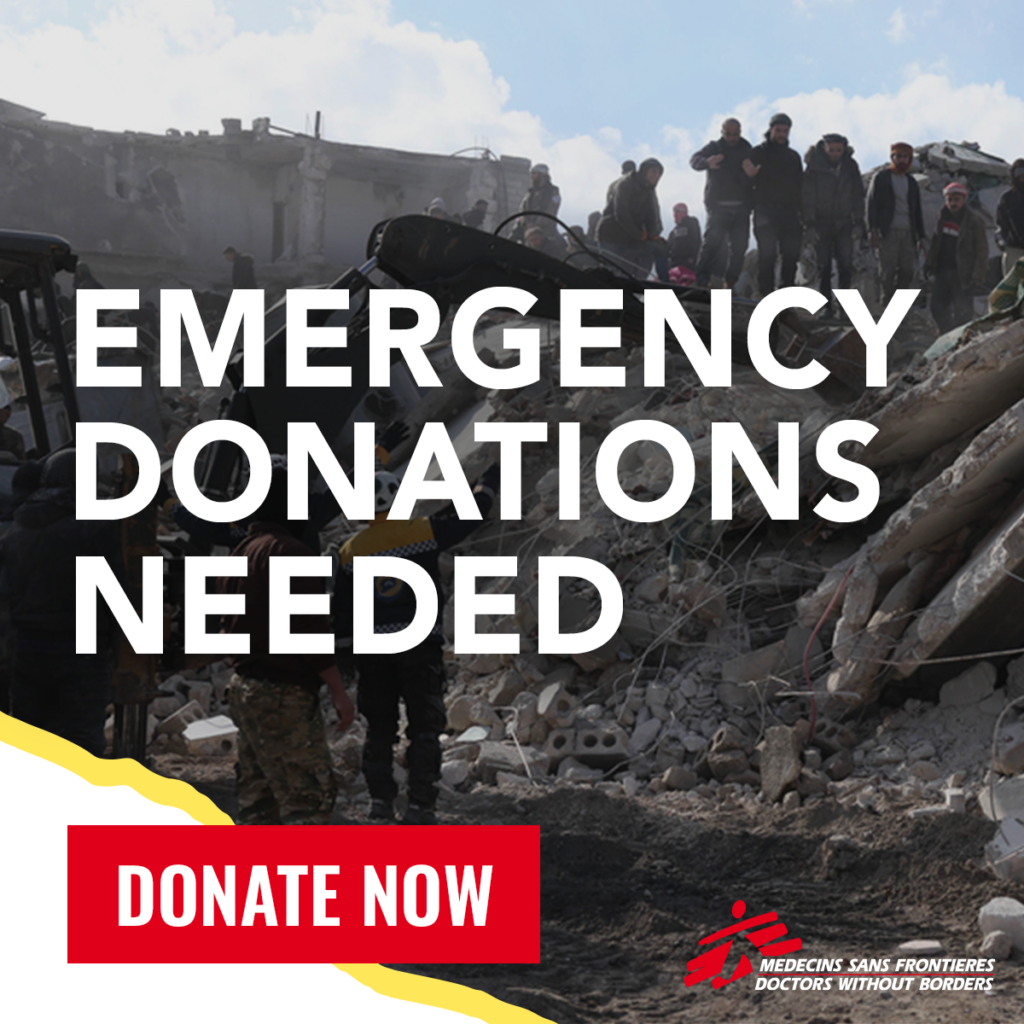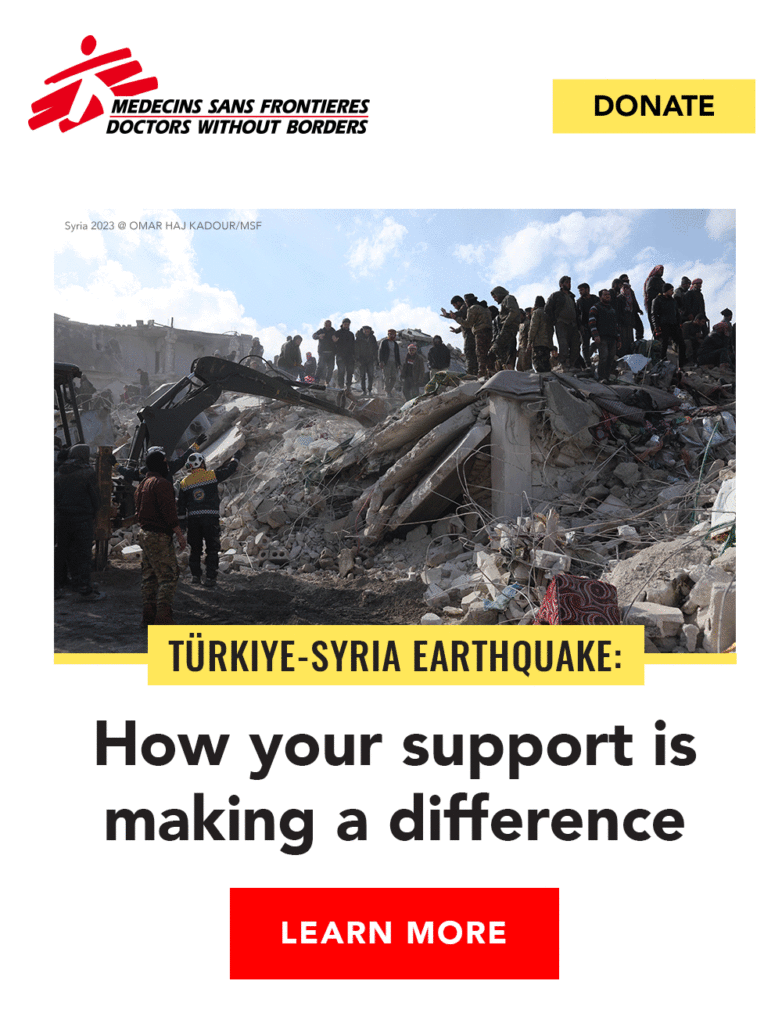Doctors Without Borders / Médecins Sans Frontières (MSF-USA) provides essential medical care to patients in more than 70 countries around the world. While its teams worldwide mobilize at a moment’s notice to humanitarian disasters, the US-based team found it challenging to launch timely emergency appeals. As its digital agency of record, Blue State partnered with MSF-USA to accelerate its emergency response campaigns.
Doctors Without Borders (Médecins Sans Frontières)
The Challenge
A global leader in emergency response faced major obstacles in quickly launching rapid response fundraising campaigns, leaving much-needed revenue on the table.
The Insight
There is no time for silos in emergency response campaigns. All teams must work in concert to deliver timely and cohesive messages – across channels and audiences.
The Solution
Build organization-wide mandate for an integrated and streamlined mobilization plan, grounded in data, to nimbly align marketing efforts when disaster strikes.
“We needed more than great campaigns, we had to work differently. Blue State pushed us on this from day one. From fundraising staff to senior executives, they helped us understand the blockers to our program moving more quickly and presented a clear and evidence-based plan for how we needed to move forward. Beyond just recommendations, they helped bring departments together so MSF could move faster than even I thought was possible.”
Mikhaela Reid, Director of Integrated Channel Marketing
Improving time to market
To help diagnose, Blue State completed an audit of the paid, earned, shared, and owned components of its previous rapid response campaigns. Through a multi-layered analysis of media trends, historical donation patterns, messaging analysis, and ad spend modeling, Blue State helped diagnose both the blockers and benefits to a new approach to emergency fundraising at MSF-USA.
Initial findings suggested that – while international departments within MSF-USA were rapidly publishing emergency information on social media or other websites – it often took days before these materials could be integrated into outbound fundraising campaigns or communications. Through a multi-year analysis of disaster donations, Blue State estimated that this slowness was costing MSF-USA millions of dollars in mission-critical revenue per year.
To truly transform how MSF-USA launched emergency campaigns, a smart analysis wouldn’t suffice. To ensure change was adopted by the entire organization, Blue State worked across multiple levels of MSF-USA, preparing a clear strategic analysis and business case for executives while simultaneously working with fundraising, marketing, and communication team leaders to define new ways of working.
At that tactical level, Blue State introduced new meeting formats to eliminate information and departmental silos while streamlining planning and approval processes. New reporting approaches gave leaders quick insights into market and campaign performance data. A holistic strategy was developed for marketing channel managers, laying out the different content types needed in each of the days following a disaster.
In total, the groundwork was laid for a strategic and tactical pivot in how MSF-USA launched emergency fundraising appeals.

Putting our work to the test
This preparation was put to the test on February 6th, 2023. When the work week was just starting on the east coast of the United States, a disaster of historic scale had struck Syria and Türkiye. A number of significant earthquakes had rocked a region that was already vulnerable due to years of conflict in Syria. MSF-USA staff in the United States texted Blue State leads early in the morning to mobilize a rapid response campaign team.
Knowing that time was of the essence, Blue State and partners at Chong + Koster had delivered email and paid advertising drafts to MSF-USA to review before the workday had even begun. By 10:00AM, Blue State had already facilitated a cross-team rapid response meeting of 45 people across agencies and MSF-USA departments to outline the plan for the next two days including website, email, social media, PR, and advertising.
Unlike the response to prior disasters, in less than 8 hours since activating the rapid response team, staff across agencies and the NGO had deployed the campaigns across channels and timezones to ensure the needs of MSF’s patients were front-of-mind for US donors and media.
Agility drives impact
In accelerating its rapid response planning, MSF-USA was able to drive significant increases to its organizational reach and revenue. In less than 7 days, more than $11 million had been raised to support its global emergency response program, a 9X increase compared to similar disaster responses in 2020.
Beyond the revenue outcomes, the integrated planning also drove significant increases in reach and awareness. MSF-USA saw increases of up to 382% in site traffic from earned media placements from outlets such as USA Today, Time, PBS, Washington Post, and the Guardian. To maximize the impact of this earned media exposure, contextual digital advertisements were launched with ROAS (return on ad spend) up to 1000X of prior emergency campaigns.

Continuing to Learn Ahead of the Next Disaster
While the emergency campaign exceeded all expectations, the work to improve channel integration and alignment continues. MSF-USA and Blue State are continuing to partner on areas for continual improvement such as development of a formal rapid response playbook and continuing to streamline creative processes. Given the historically lower retention rates of emergency response donors, MSF-USA has asked Blue State to invest additional time in analyzing the post-disaster stewardship and reporting processes.
The business case no longer needs to be made for why a holistic and nimble approach is needed when disaster strikes. Through integrated planning and leading with digital, rapid response efforts can propel an organization even further.
Results
- $11M in digital revenue in 7 days following Türkiye-Syria earthquake
- 9X more emergency revenue than prior disaster campaigns
- 60% faster time to market following a disaster